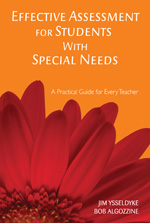
Hands-on, Practical Guidance for Educators
From math,
literacy, equity, multilingual learners, and SEL, to assessment, school counseling,
and education leadership, our books are research-based and authored by experts
on topics most relevant to what educators are facing today.
Effective Assessment for Students With Special Needs
At last, a practical guide to the what, how, when, and where of effective assessment!
With guidelines for determining student eligibility for special education services, this practical handbook shows educators not only what sort of assessment method is most appropriate, but how, when, and where it should be administered. Including a pretest, posttest, and key vocabulary terms, this handbook provides information about:
- Formal and informal methods of data collection
- What various assessment practices can show an evaluator
- Standards for conducting assessments to ensure accuracy
- Data-driven decision-making for the education of exceptional students
- Grade Level: PreK-12
- ISBN: 9781412938969
- Published By: Corwin
- Year: 2006
- Page Count: 144
- Publication date: March 21, 2006
Price: $25.95
For Instructors
When you select 'request review copy', you will be redirected to Sage Publishing (our parent site) to process your request.



